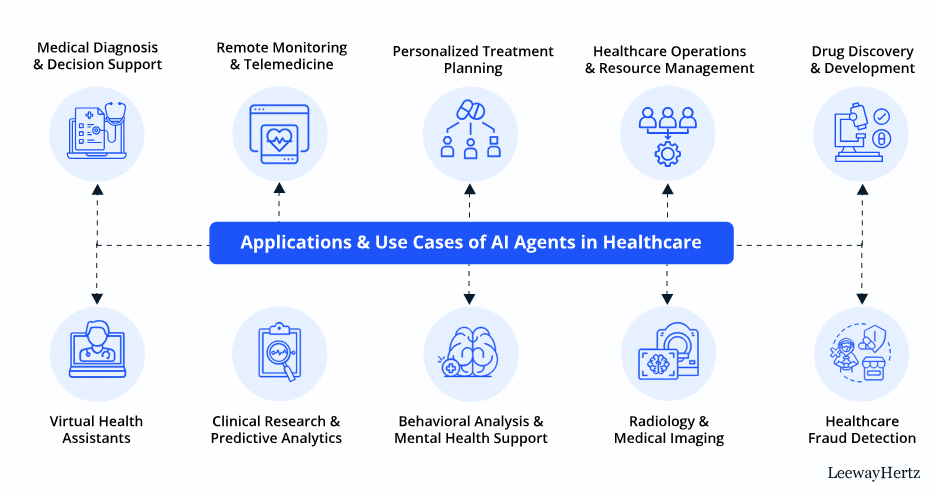What Do You Want to Learn About Today?
Applications and use cases of AI agents in healthcare

AI agents play a crucial role in various applications within the healthcare sector, leveraging artificial intelligence to enhance efficiency, accuracy, and patient care. Here are some key applications and use cases of AI agents in healthcare:
- Medical diagnosis and decision support: AI agents are used to assist healthcare providers in diagnosing medical conditions by analyzing patient data such as symptoms, medical history, and test results. These agents can suggest potential diagnoses or recommend further tests or treatments based on their analysis of large datasets and medical literature.
- Personalized treatment planning: AI agents help in creating personalized treatment plans for patients by analyzing individual health data, genetic information, and treatment outcomes. They can recommend tailored interventions or therapies that are most likely to be effective based on the patient’s specific health profile.
- Remote monitoring and telemedicine: AI agents support remote patient monitoring by continuously analyzing real-time health data from wearable devices or IoT sensors. They can alert healthcare providers to any anomalies or changes in a patient’s condition, enabling timely interventions and reducing the need for in-person visits.
- Healthcare operations and resource management: AI agents optimize healthcare operations by streamlining administrative tasks, scheduling appointments, managing electronic health records (EHRs), and allocating resources efficiently. They can automate routine tasks, freeing up healthcare professionals to focus more on patient care.
- Drug discovery and development: AI agents contribute to drug discovery and development processes by analyzing vast amounts of biomedical data, identifying potential drug candidates, predicting their efficacy, and simulating their effects on biological systems. This accelerates the research and development cycle for new medications.
- Virtual health assistants: AI-powered virtual health assistants interact with patients to provide information, answer medical questions, schedule appointments, and offer reminders for medication or follow-up care. These agents enhance patient engagement and adherence to treatment plans.
- Clinical research and predictive analytics: AI agents support clinical research by identifying suitable candidates for clinical trials, analyzing trial outcomes, and predicting patient responses to treatments. They use predictive analytics to forecast disease trends, optimize healthcare delivery, and improve population health management.
- Natural Language Processing (NLP) in healthcare documentation: AI agents equipped with NLP capabilities help healthcare providers by transcribing clinical notes, extracting relevant information from medical records, and generating summaries for easier review. This enhances documentation accuracy and efficiency.
- Behavioral analysis and mental health support: AI agents analyze behavioral patterns and psychological data to assess mental health conditions, monitor changes in emotional well-being, and provide personalized mental health interventions or therapy recommendations.
- Patient education and health promotion: AI agents deliver personalized health education materials, wellness tips, and preventive care information to patients based on their health status and preferences. They promote health literacy and empower individuals to make informed decisions about their well-being.
- Radiology and medical imaging: AI agents assist radiologists in interpreting medical images such as X-rays, CT scans, and MRIs. They can identify anomalies, highlight areas of concern, and prioritize urgent cases based on image analysis and comparison with vast databases of medical images.
- Genomics and precision medicine: AI agents analyze genomic data to identify genetic variations linked to diseases, predict individual disease risks, and recommend personalized treatment options based on genetic profiles. This supports precision medicine initiatives aimed at delivering tailored therapies.
- Healthcare fraud detection: AI agents use predictive analytics to detect anomalies in billing patterns, flagging potential cases of healthcare fraud or abuse. By analyzing vast amounts of transactional data, they help healthcare organizations mitigate financial losses and ensure compliance with regulatory requirements.
- Clinical trial design and patient recruitment: AI agents optimize clinical trial design by analyzing patient demographics, medical histories, and predictive models to identify suitable participants. They help streamline recruitment processes, improve trial success rates, and accelerate the development of new treatments.
- Epidemiological surveillance and outbreak prediction: AI agents analyze population health data, including demographic trends, environmental factors, and disease incidence rates, to predict outbreaks, monitor disease spread, and inform public health interventions. This early detection capability supports proactive healthcare strategies and epidemic control measures.
- Continuous Medical Education (CME) and training: AI agents facilitate ongoing medical education by delivering personalized learning modules, simulating medical scenarios for training purposes, and providing feedback based on performance. They support professional development among healthcare professionals and ensure adherence to best practices.
- Healthcare IoT integration and data management: AI agents integrate with IoT devices to monitor patient vitals, manage chronic conditions remotely, and analyze real-time health data streams. They enhance data interoperability, ensure data security, and enable seamless communication between healthcare devices and systems.
- Ethics and decision support: AI agents assist healthcare providers in navigating ethical dilemmas by providing guidelines, ethical frameworks, and decision-support tools based on established medical ethics principles. They facilitate informed decision-making while considering patient preferences, cultural factors, and legal considerations.
- Patient satisfaction and experience enhancement: AI agents analyze patient feedback, sentiment analysis from surveys, and social media interactions to gauge satisfaction levels, identify areas for improvement in healthcare services, and personalize patient interactions to enhance overall experience and engagement.
In conclusion, AI agents are transforming healthcare by leveraging advanced algorithms and machine learning to improve diagnostic accuracy, personalize treatment approaches, optimize healthcare operations, and enhance patient engagement and outcomes across various domains of medical practice.






